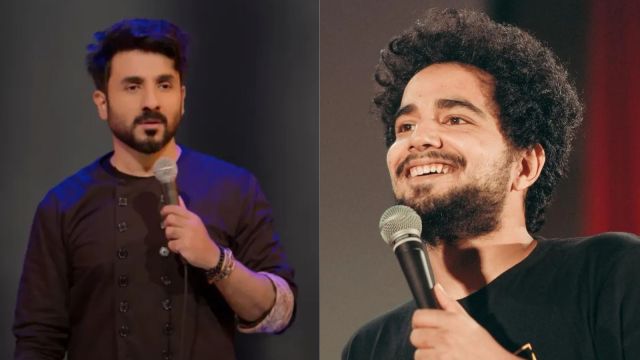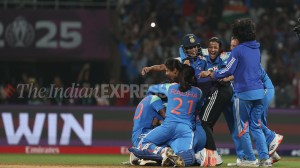Stay updated with the latest - Click here to follow us on Instagram
From Vir Das to Samay Raina: The rising tide of controversies stoked by Indian comedians
Amid the Ranveer Allahbadia controversy, a look at how comedians in India have often faced the brunt of legal challenges when their jokes have crossed into ‘offensive’ or ‘obscene’ areas.
 Comedians in India have long faced the brunt of legal challenges, particularly when their humour crosses into areas considered “offensive” or “obscene”. (File Image)
Comedians in India have long faced the brunt of legal challenges, particularly when their humour crosses into areas considered “offensive” or “obscene”. (File Image)With the controversy surrounding podcaster Ranveer Allahbadia’s remark on ‘India’s Got Latent’, the spotlight is back on the complex relationship between comedy, moral values and politics in India.
On an episode of ‘India’s Got Latent’, a YouTube comedy show hosted by comedian Samay Raina, guest judge Ranveer Allahbadia posed a question to a contestant: “Would you rather watch your parents have sex every day for the rest of your life or join in once to stop it forever?” As the video clip of the question went viral, a tidal wave of outrage from viewers and public figures followed, with many terming the question “vulgar”, “obscene”, and “unacceptable”.
From Vir Das to Tanmay Bhat: When comedians faced flak
Comedians in India have long faced the brunt of legal challenges, particularly when their humour crosses into areas considered “offensive” or “obscene”.
Take, for example, Vir Das, whose stand-up special ‘I Come From Two Indias’ stirred outrage for allegedly criticising India’s political landscape and its handling of women’s safety. The alleged controversial statements made in his performance, including the line “In India, we worship women in the day and rape them at night”, led to two separate police complaints against Das in Delhi and Mumbai. In both cities, politicians and activists demanded police investigations, accusing the comedian of defaming the nation.
Similarly, Munawar Faruqui, another comedian known for his sharp wit, was arrested in Indore before a performance for allegedly hurting religious sentiments through comments on his previous shows.
Comedian Tanmay Bhat’s mock conversation with Lata Mangeshkar and Sachin Tendulkar in 2016 also landed him in trouble as it was deemed disrespectful by the Shiv Sena and the BJP. The backlash led to calls for action against Bhat, along with other AIB members.
The infamous AIB Knockout roast, which featured actors Ranveer Singh and Arjun Kapoor, also drew criticism, leading to FIRs and the removal of the video from YouTube.
These cases are part of a larger trend where India’s legal system has been called to mediate the boundary between ‘free speech’ and ‘cultural sensitivities’. The difficulty in defining what constitutes ‘obscenity’ or ‘offensive’ content makes comedians vulnerable to prosecution, regardless of the intent behind their performances.
What the law says
The legal provisions that govern such cases fall under multiple sections of the Bharatiya Nyaya Sanhita (BNS) and the Information Technology (IT) Act. For instance, Section 294 of the BNS criminalises “obscene acts,” with punishments ranging from fines to imprisonment. Section 67 of the IT Act similarly targets the “publishing or transmitting obscene material” online, a charge that can carry severe consequences.
However, legal experts point out the evolving nature of such cases.
Faizan Ahmad, a practising advocate at the Supreme Court, noted that courts have traditionally relied on the “community standards” test to evaluate what is deemed obscene. “Courts earlier used to interpret obscenity as acts with the ‘tendency to deprave and corrupt minds susceptible to immoral influences,’ famously known as the ‘Hicklin test’, which was derived from Victorian-era morality standards,” Ahmad explained.
“Now, courts have adopted a ‘community standards’ test, drawing from context and relevant circumstances. Recently, in 2023, the Bombay High Court held that provocative dance performances and suggestive gestures by women do not constitute ‘obscene’ or ‘immoral’ acts. Yet, despite a relatively liberal interpretation by courts, obscenity standards continue to remain context- and fact-specific,” he added.
“It is important to note that under the new code, the Bharatiya Nyaya Sanhita, Section 294 criminalises the display of any content in electronic form deemed obscene if it is lascivious or appeals to the prurient interest, or if its effect or the effect of any one of its items if multiple is, as a whole, such as to deprave and corrupt those who are likely to see or hear it. This means that under the new code, courts might take a more conservative interpretation of obscenity based on the text of the section,” Ahmad said.
“As to proving what constitutes provocation in a sexual sense, it largely depends on how judges interpret context and community standards. A reference can be made to the Kerala High Court ruling in 2023, where a criminal case against a mother, who made a video of her children painting on her semi-nude body, was dismissed. The court held that the depiction of a woman’s naked body is not obscene,” he added.
Adding another layer of legal complexity, Virag Gupta, a Supreme Court advocate specialising in cyber law, highlighted the role of platforms like YouTube. “The responsibility of these platforms is often unclear. While they operate under US laws, which might be more lenient about adult content, Indian regulations on obscenity are stricter,” Gupta said. He also noted that invoking multiple FIRs across states could set a troubling precedent for online content creators, with authorities pushing for stricter censorship of digital content.
What lies ahead?
As the fiasco continues, the question of where to draw the line between a joke and an offence remains a central issue. One thing is clear: the challenges faced by Ranveer Allahbadia, Samay Raina, and others involved in ‘India’s Got Latent’ are just the latest chapter in the ongoing struggle to define the limits of free speech in India.
The outcome could well set a precedent for the future of comedy in India. Will it encourage more cautious and self-censored humour or will it embolden the comedians to continue pushing the boundaries of what can be said in the name of laughter?







